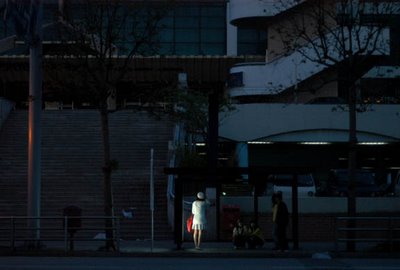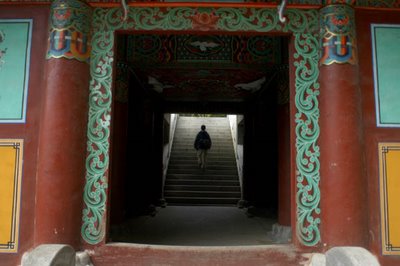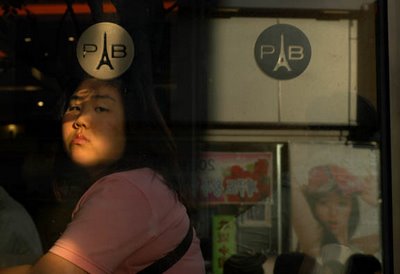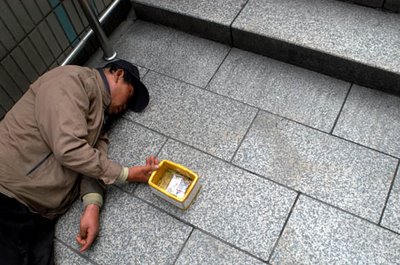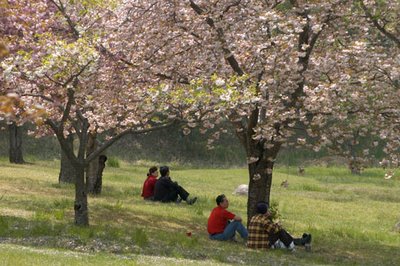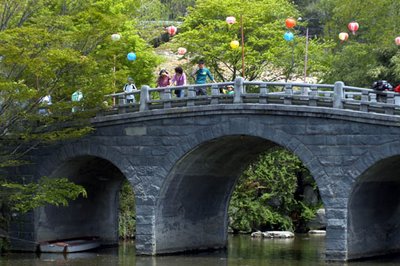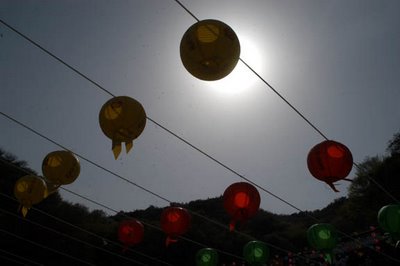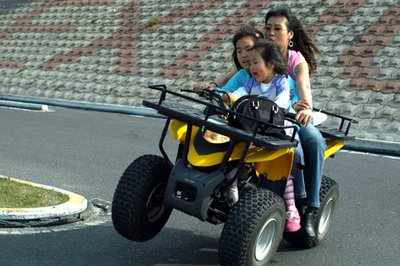
The sticker chicken is the latest technological breakthrough, second only to the Sticker Monkey in effective apathy control. They cost a buck and justify their cost immediately. Nothing gets the class quite as engaged as the ability to hold the Sticker Chicken.
"Oh, Mr. Jones, Mr. Jones, ipuda! Let me have the Stickuh Chicken!"
I use a point system for rating the answers to my questions. I can't take credit for this system. It was originally formulated by Gavin. "Not bad" is one point, "Very good" is two points, "Excellent" is three points, "Super Amazing Incredibly Cool Good Shot Dude" is four points and "Perfect" is five points plus the Sticker Chicken. You can guess how rarely that last designation happens. The child who made the amazing sentence gets to hold the chicken until another student makes an equally impressive sentence. Then the chicken trades hands. At the end of the class, the student with the chicken gets a sticker.
Elections for local office are going to be held on Wednesday. Candidates have pasted up posters with their picture and the number voters can find on the ballot.

During the day the candidates drive around in Bongos (A type of small truck) topped with campaign paraphernalia and blare their message with a roof-mounted bullhorn at an earsplitting decible level. You can imagine how annoying this is. In the mornings I routinely walk past lines of campaign volunteers chanting up support for their candidates. They hand out pamphlets, sing songs and cheer. Sometimes the candidate himself is there.
One evening last week I walked past just such a group and the candidate, Go Dae-young, introduced himself to me. He said that this is the first election where the office holder will be paid a monthly salary - $250. Hmmmmm. Doesn't seem like enough to live on to me, I mused, certainly not enough to justify these relatively large campaigns. He was a young guy, mid-thirties, looked like. He spoke very good English - A big plus. I asked him if foreigners with an E2 visa could vote and he shook his head no. So I can't vote, but if I could, I would vote for him. I'll vote for anyone who will go out of his way to explain to a foreigner the Korean voting system when he could be talking to people who can actually vote.
I snapped a few frames this week from the Gukje Market.



On Saturday, I went to Centum City with my new friend, Hyun-jeong. I met her at the art museum last weekend, and we walked to Haeundae together. She is very intelligent, open-minded and I enjoyed talking to her as we traveled from the art opening to Kaeunsung on Saturday. She showed me an Indian restaurant and an outstanding tea house that played protest music from the 1980s, sort of the Korean equivalent of Joan Biaz. She was a wealth of information on modern Korean history, and she spoke at length about Park, Jeong-hee and the rise of democracy in Korea. After tea, we caught a live jazz show at The Monk.
I said my good-byes to Hyun-jeong at the KU station. It was an awkward affair because we were on opposite platforms and we couldn't yell across to each other because our voices were wiped out by the sounds of the station. Also, I was experiencing some mild shivers, as if I were cold, but the air was a pleasant temperature. By the time I walked out of the station in Nampo-dong, I knew I had food poisoning. My stomach was in knots and my body was shaking violently. Go see a doctor, Stephen, I implored with myself, go to a hospital. Money. That costs money, I thought and stubbornly got into a cab.
I spent all day Sunday throwing up, racked with abdominal pain. Even as I write this, I can barely sit up. I hope Hyun-jeong doesn't have the same virus. Luckily, Kristen and her boyfriend - also named Kristen - came Sunday to buy Gavin's motorcycle, and they brought me medicine. It made my stomach feel better, but it liquified the contents of my bowels. You don't want to know.

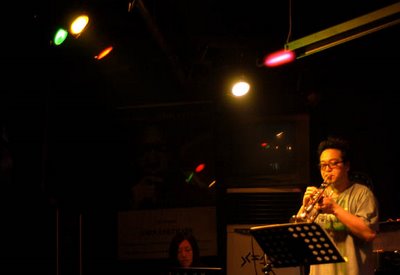
Every Friday Gavin and I get samgyupsal at this place up the street from ESS. It's usually crowded, and this last Friday was no different. Except now the World Cup exhibition game between Korea nd Sweden was being played on the big screen TV. Everyone's attention was on the soccer players. Every time Korea would score a goal or come close to scoring, the whole place would erupt into cheering.
Nationalism is a powerful thing. I don't want to be out of doors when and if they play the Japanese. The Korean's reaction to the game is so different from my own feelings towards the American soccer team. I want them to win, sure, but in all honesty, I don't really care if they do or not. I compare my feelings to those of a Yankee's fan...Hey, we got the most money, surely we'll beat the tar out of everyone else. However, World Cup soccer isn't like that, and there is a high probability that poorer, more deserving teams will win the title. I am an American, but I'll probably cheer for Korea. Call me a sap if you like.

The colorful busstops of Young-do.

The view of an alley from the teacher's office at ESS.

Among our advanced classes, none have made quite as good an impression and Gavin and I as Advanced Three. Actually, they were labeled Advanced Two when Gavin started teaching them twice a week last winter. After they graduated to fifth-graders in March they became Advanced Three and they traded Mr. Averill for Mr. Jones.
From the beginning, Gavin and I were shocked by the measurable difference between the children in Advanced Two and the bulk of the children at ESS. They were extremely attentive, well-behaved children. Gavin taught them grammar and conversation twice a week and I took A2's weekly reading day on Thursdays.
I always taught Advanced Two following 4B, a class that gave new meaning to word 'chaotic.' I would enter Advanced Two in something like a bad mood, my shirt covered in chalk, my books in an disorganized stack under one arm and in the space of 45 minutes the enthusiasm, intelligence and dedication of Advanced Two had undone all of the atrocities wrought by 4B. They were a breath of fresh air.
Gavin and I used to joke that the parents of the children in Advanced Two went out of their way to shield their children from the other students at ESS. They had so much 'spark,' so much enthusiasm and interest in the material that Gavin would agonize for hours trying to come up with games and activities that would sufficiently challenge these deserving children.
"I can tell their minds are hungry for better material," Gavin would often say to me as he sweated bullets retrofitting his daily two-page syllabus-mandated lessons (such as one on the phrase "it is") into something more provocative. "I can't let them slip," Gavin would say, referring to the horrible slide into apathy and disinterest exhibited by some of the other children at ESS.
"Their minds want more."
Gavin and I used Advanced Two as a testbed for more complex, daring activities. Some worked, and some didn't. Gavin and I encourage the children in our classes to participate by awarding team points for correct answers to our questions. Since the classes are usually roughly divided into a team of girls and a team of boys, the ensuing battle-of-the-sexes normally fans the flames of competition.
In such a darwinian environment, children begin to form loose social constructs complete with leaders, subordinates, go-to guys, outcasts, and court jesters. Advanced Two was no different. The classroom was chock full of strong personalities vying for leadership.
As the weeks and months progressed, two students solidified their positions on either side of the aisle. On the boy's side, the suave, clearheaded Jin-soo was the natural choice among his peers to take the reigns in the fight against femininity. On the other side of the sexual divide was the formidable, disciplined Han-sol, who turned the girls into a crack team of English-speaking commandos with her talent for organization, leadership and of course, English.
Most of the children in Advanced Two were indeed advanced English speakers, and they all possessed a talent for picking up the language. Their level of comprehension is extremely high, and they make a habit of speaking to me in complete sentences. They are among the only students I teach who consistently ask me questions about the language. Even on an individual basis, they are talented learners. Gavin or I often spot Jin-soo standing by the water cooler and just listening intently as we talk to each other before class. The only person who compares to Jin-soo is his female counterpart, Han-sol.
From the first day I met her, Han-sol has been an English juggernaut, able to incorporate new concepts into her existing language constructs in a matter of minutes. She has a large vocabulary, and I periodically hear an idiom or two come from her mouth, phrases I don't recall teaching her. Better still, Han-sol is a leader, and during games last winter the other girls would rally around her and look to her for guidance.
Gavin and I always got a kick out of Han-sol. Her energetic, can-do spirit combined with her quick wit and self-confidant smile always managed to bring out the best in those around her, including me. She has a nervous tick that makes her eyes dart back and forth and the wrinkles in her forehead quiver whenever I ask her a question.
"Han-sol, what does a doctor need?" I might ask, and Han-sol's eyes would start darting and blinking.
Gavin and I joke that the nervous tick is the outward sign of Han-sol's brain accessing the information, like the blinking light on a computer hard drive. As soon as she finds the answer her eyes lock onto mine and her face relaxes.
"A doctor needs a knife, gloves and medicine," she deadpans. Wow. I know that doesn't seem like much to you viewers at home, so just take my word for it: Wow.
She is the girls team's blue chip, their ace-in-the-hole. She also was extremely intimidating to the boys up until a few weeks ago. A rumor spread among the girls that Han-sol and Jin-soo were in love. The boys caught on and fed the fires around the gossip, which of course, wasn't true at all. Jin-soo played it cool, smiling calmly when the boys would pick on him, feigning disgust but loving the attention. Han-sol was a different story.
When it started, she took the teasing just as well. She would crack a patient smile like if she just kept her mouth shut the gossip would eventually get old and die off, and it would have except for her teacher. I thought the fake scandal was funny, and I didn't see the harm in joining in. When the class was getting heavy or the material was boring, I'd do things to get their attention like pole the class to see how many babies Jin-soo and Han-sol would have. Big mistake.
The constant negative attention began to get old and wear Han-sol down. I didn't see it until was too late. Her tolerant smile turned into a steely frown whenever her classmates would poke fun at her, and she would desperatly implore with them to shut up. I didn't think anything of it until I noticed that her hand wasn't in the air as much, that she wasn't as interested in helping her classmates or scoring points. She would sit in her chair on the front row, an arm over the chair back, a patient, quite look in her eyes, as if waiting for these idiots to go away. There was a disconnected feeling coming from Han-sol that worried me.
The gossip had to stop. I quickly recognized my blunder and tried to make things right with Han-sol. I wasn't about to let my star student get silenced by insinuation of a torrid affair with Jin-soo. Using the dictatorial power of a teacher, I crushed the gossip, at least within the class. With my attention removed from it, the gossip lost its edge. The strategy worked. Han-sol began answering questions again and participating in the lessons. However, she has not been her old self.
While Han-sol was weathering the storm, other girls vied to fill the leadership role. Moon-jeong, a tom boy who sits next to Han-sol, has taken the reigns. Moon-jeong is much more gossip-resistant. Whenever the boys try to insinuate that she likes Yoon-mo, a boy in the back of the class, she looks over her shoulder, snorts and shoots them a bored, sarcastic look. Han-sol still plays a major role on the girl's team, but she is not the leader any more.
I couldn't believe it. The implication of love with the leader of the enemy had brought down a powerful force within the class.
I felt, and still feel, horrible. Here I am, the adult, showing behaving no better than the other children, showing no compassion or sensitivity to one of my students. Such shortfalls in judgment make me seriously question myself. Am I an adult? Do I have any business thinking of myself as such?
I can remember as a child wondering how I would look as an adult. Would I be tall? Would I be fat? What job would I have? When would I get to drive a car? A little of my wondering was pure disbelief. Adults were so different from me, it was like they were from another planet. Even my parents, people I trusted beyond even God, seemed to care about random or mysterious things I could not grasp.
From the perspective of a child, the gap between childhood and adulthood seemed too vast and wide a chasm for anyone to cross. I know now that I lacked a clear picture of the other side. I couldn't wrap my mind around the perspective of someone decades older than myself. All I knew was that everyone, eventually, became an adult. It always felt too far away to grasp, an inevitability that would materialize somewhere a long, long time from now, like death.
I stepped into the elevator one morning last week, looked in the mirror pasted to the wall and realized in a flash that the chasm had been crossed. I am an adult. As the elevator dropped through building 402, whatever doubts I had to the contrary evaporated. I examined my face in the mirror. Much of the golden blond hair on my head has retreated and turned a light brown. There are wrinkles around my mouth and under my eyes. Stubble clouds my complexion and the skin hangs looser on my neck.
But the aging of my face was hardly the catalyst for the epiphany. There was a strange, tired look in my eyes, the same gaze I can remember seeing in the eyes of adults when I was a child, a resigned sort of expression like the world didn't turn out as magical as promised. At long last, I had those eyes, windows into the imperceptible passing of time. At long last, I was on the other side of the chasm, looking back. But instead of wondering about an unforeseen future, I was grasping at a fading past.
One of my early fears about teaching was that I wasn't a 'grown up' yet, that I lacked the maturity one must have to hold authority over children. How could I, Stephen Jones, 26, careless, penniless, bumbling Stephen Jones hold authority over anyone? How could I profess from the high podium of my greater number of living years when during those years the world had only become darker, bigger and more confusing and I had made so many poor decisions. As I age I feel less and less 'in the know' and more and more 'freaking confused.'
For the first few months in Korea, I taught from the flimsy vantage point of this fear: Fear that the children would unmask me for the scared little boy that I thought I really was, reveal me to be just another child hiding behind the mask of adulthood. Many people grow up without actually becoming adults. I see them all the time in reality TV shows. As Jonathan Kozol wrote in his book, "Death At An Early Age," many adults are just damaged children. I arrived in Korea carrying these doubts, and in large measure, they have mostly been put to rest. I am an adult, and though from time to time I might act immaturely, such as with Han-sol, there is no denying what I have become.
Nowadays, I find myself asking, when did I make this transition? When did I go from the child looking up to the adult looking down? When did I earn the right to profess knowledge of the world or have the authority to stand above all of these bright-eyed children gawking up at me? In them, I see everything on the other side of the chasm that I took for granted back when I was standing there myself.
Gavin made the remark, and I am seriously paraphrasing here, that the children who make him the saddest are the ones who exhibit all of the cynicism and antipathy of adults, the ones who appear to have lost the boundless curiosity and enthusiasm of childhood. I couldn't agree more. In my 1-2B class, there is a spoiled little girl named Ji-hyun, who saddens me with her apathy, disinterest and sometimes outright rebellion against learning. What or who robbed this child of the unbridled energy of childhood?
Well, I'm still feeling like dookie, so I'm going to wrap this up and get some sleep. If I'm still barfing and craping like there is no tomorrow, I'll go see a doctor and you can hear all about the language-induced perils of medicine in a foreign country. Gavin has had good experiences with the doctors here, so that's encouraging, and my Korean health insurance brings the price of the visits down to a dollar or two. I hope everyone is doing well, and look forward to coverage of election day on Wednesday. Have a good Memorial Day. Peace. --Notes







